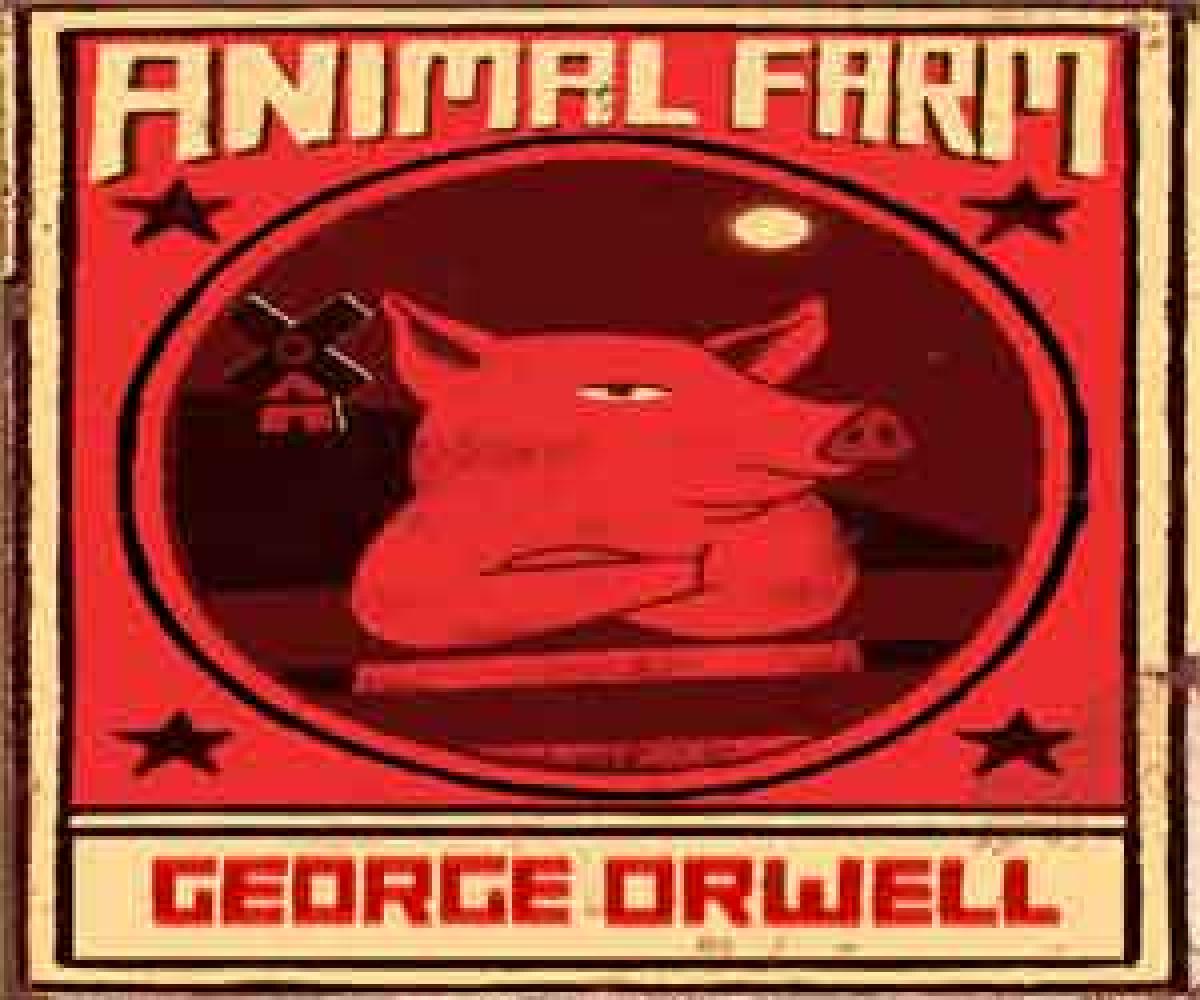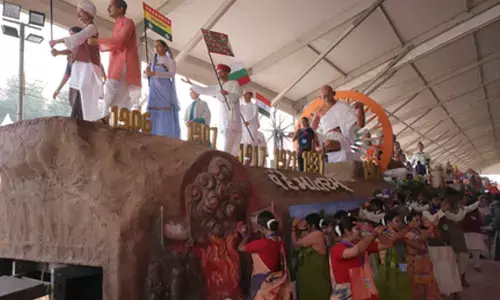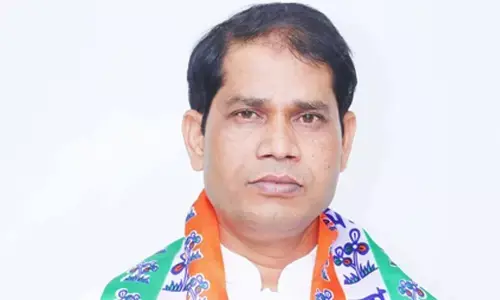Animal Farm permeates political discourse

The contemporary political discourse is increasingly corrupted, vulgarised, vandalised and brutalised, all in the name of democracy and people’s interests. Various players in the political arena are effectively portraying the roles of various animals as portrayed in Animal Farm, George Orwell’s literary classic.
The contemporary political discourse is increasingly corrupted, vulgarised, vandalised and brutalised, all in the name of democracy and people’s interests. Various players in the political arena are effectively portraying the roles of various animals as portrayed in Animal Farm, George Orwell’s literary classic.
A discernible political analyst or for that matter even a political novice cannot ignore startling but captivating similarities between the theme of the novella and current democratic political discourse. Individuals firmly saddled in political power hierarchy twist and manipulate the ideologies and the language of democratic discourse to legitimise anything and everything so as long as their vested interests are served.
In the name of democracy, the ruling party ascribes to itself divine sanctity. Voices of the political opposition and civil society are stifled. Even genuine questions are branded as political conspiracy to sabotage indefatigable developmental efforts. Thus this animal farm sentiment is used to engineer political castigation instead of welcoming constructive opposition that can provide timely wake-up calls whenever the government goes overboard
Critics are lampooned and alternative viewpoints are pooh-poohed. The basic character of democracy reflected in plurality of voices and choices is choked and challenged on the pretext of political realignment and ‘serving the cause of development’. Anyone who raises fundamental questions of this paradigm is dismissed as persona non grata. Friends and foes are characterised and caricatured to suit the personal political agenda that has neither any objectivity nor political morality.
The introduction to Animal Farm states that in the commune established by the animals, it was claimed that all animals are equal. However, class and status disparities between animal species emerge. In a sharp similarity, democracy considers all political species as equal players.
But in the power structure that democratic mandates produce, the winners feel they are blessed souls; anything contrary is often portrayed as demonic or devilish. The wisdom that flows from the repositories of power is confused with gospel truth. Political orthodoxy makes it unquestionable and unassailable until reversed by yet another electoral mandate.
True realisation of democracy is made impossible by the corrupting nature of the very power essential to run the democratic order. People’s mandate brings one to power in democracy. Sadly, once voted to power, the ‘rulers’ gradually build up their power much like Orwell’s character, Napoleon (the main tyrant of Animal Farm), by taking leaders from other parties whom they earlier called vicious leaders.
That is how perhaps ‘politics makes for strange bedfellows’ came into being. Democratic rulers thus usurp full power using even false propaganda, threats and intimidation to keep the other political animals under check. In a rather strange similarity with the contemporary democratic rulers, the novella explains how one gradually changes the commandments to justify one’s dictatorial rule and the privileges that come along.
As Napoleon (a Berkshire boar) drives away Snowball (Napoleon’s bête noire wild boar), the democratic rulers overwhelmed by public mandate leave no stone unturned to drive away the opposition from the democratic political farm. ‘To uphold people’s mandate’ is the glib reassurance they give us.
In the novella, Snowball genuinely works for the good of fellow-animals and devises plans to help them achieve their vision of an egalitarian utopia only to be chased away by Napoleon and his dogs. Not one to rest content, Napoleon spreads canards about how Snowball was devilishly sabotaging the animals’ efforts to improve the farm.
The illustration perhaps perfectly fits into the current political scenario in Indian democracy. Elections herald governments. In the name of democracy, the ruling party ascribes to itself divine sanctity. Voices of the political opposition and civil society are stifled.
Even genuine questions are branded as political conspiracy to sabotage indefatigable developmental efforts. Thus this animal farm sentiment is used to engineer political castigation instead of welcoming constructive opposition that can provide timely wake-up calls whenever the government goes overboard. In fact, such a true democratic approach would help the party in power to prevent political apocalypse for itself. And win the hearts of millions of people.
But political parochialism and power-induced political brinkmanship robs away political sagacity and magnanimity from people in power. A bunch of sycophants who cling to the seat of power for their own political aggrandisement makes it further impermeable for those sitting in the seat to glean through the reality.
The propaganda function in the Animal Farm is served by Squealer, a small fat porker, which acts as Napoleon’s public speaker. Similarly a group of outspoken followers of the democratic ‘ruler’ performs the act of manufacturing consent. The methods adopted are often crude.
Dissent is attacked and throttled. Reasonable political engagement is often amiss. Argumentative tradition of Indian philosophical discourse is disappearing from the democratic dialogue. Television-sponsored shouting matches day in and day out trivialise and anaesthetise the very purpose of the debate. The tribe that dominates the echelons of political power often defines and determines the dissemination of ideas.
As Squealer does it for Napoleon, the so-called spokesman manipulates the language to excuse, justify and extol all of the master’s actions. As George Orwell has always shown, politicians use language. The leaders who gain command over this language often dominate in the war of polemics. In post television democracies, this characteristic can prove to be in handy for those who want to manipulate public opinion in their favor.
Like Squealer, politician limits the debate by complicating it and he confuses and disorients. The ruling politicians claim that they need the extra luxury they are taking and the powers they are enjoying to function properly. Of course, they want us to believe that is the essence of electoral mandate. But electoral mandates does not shower divine sanctity. More so in the ‘First Past the Post’ electoral system where a party reaps the mandate even without getting representative voting.
Democracy is an interaction of thoughts and assimilation of ideas. It’s a confluence of political view points. It’s a convergence of ideological postulates. The people in power should display such a spirit of democratic accommodation as governance is a continuous process. The government of the day is not an absolute authority.
It’s only a trustee for that period for which it is voted to power. Ruling politicians often use information and statistics to suggest that life is getting better and better. Nothing wrong in doing so, but the problem is that they are impervious to any other independent information. Political restlessness pervades. People are convinced as the memories of past governments fade out.
Like Napoleon of Animal Farm, leaders have a dubious reputation for getting their own way. Political parties, and even the prevailing political landscape, are so organised to meet this purpose of serving the leader. Parties employ proven orators resembling the character Squealer of the Animal Farm. They often act as messengers of their master using every opportunity for a verbal assault.
A bunch of such talkers attempts to convert the leaders’ opinions into a ‘complete system of thought’ to which they give the name of an ideology. Thus parties are losing their political and ideological identity. Embracing the leader’s changing thoughts is supposedly their programmatic understanding. Thus like the ‘Animalism’ of Orwell, democracy is gradually slipping into a quagmire to be equated with ‘leaderism’.
The leader frequently closets with a select band of confidants, aka coterie, and evolves the principles of leaderism. Thus the gospel of leaderism is then flown down to the party rank and file. Loyalty to the master is perpetuated in the name of Leaderism. Anyone who embraces this Leaderism turns into a political puritan irrespective of one’s past histrionics.
Thus the Leaderism is perceived as the holy river that can cleanse the blind follower of all his ills. Leaderism is a holy script and whoever recites it becomes the champion of the cause and is absolved of all the past sins. Someone who rebukes even the perversions of Leaderism even if that person was a closest ally is perceived as a conspirator and an agent of alien elements hell-bent on destroying the divine ruler.
Thus any critical adversarial activity is branded as sacrilegious and anti-thesis to development on which the majestic leader alone has a patent, both product and process.The Leaderism wants us to believe that power is arbitrarily exercised not out of selfishness and privilege but to promote the interests of the people.
Both the leader and the avid followers zealously preach that the former dislikes power but exercises it for the sake of the people. The Leader, in fact, claims that he or she would like to shed power at the slightest opportunity but history levies on them the gigantic responsibility as they personify all that is wise, clever and considerate. Leaders propagate the stories of wonderful society under their rule.
‘Day and night we watch over your welfare’, tells the Leader to the people as the pigs tell the other animals in the farm. As depicted by George Orwell in the novella, the democratic political farm symbolises the Animal Farm and signifies the message loud and clear.
















